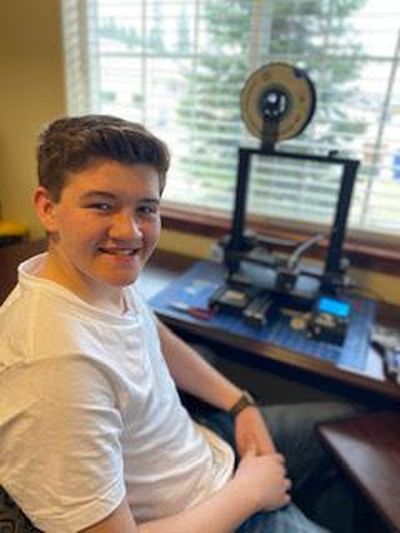Shawn Vestal: NC sophomore puts 3D printer to work making protective masks

For those caring for the sick face to face, the supplies of so-called PPE – personal protective equipment – have become a paramount issue.
Connor Duncan, a 16-year-old sophomore at North Central High School, is using his 3D printer to boost that supply. Following guidance he found in a YouTube video, Duncan has made some 15 face shields for his mother and others who work for DispatchHealth, providing urgent care services for people in their homes. Using the printer, he makes mask frames that can hold a clear protective shield; the shields can be replaced or sanitized.
“I just wanted to protect her and protect her team so they can take care of patients,” Duncan said.
Christina Duncan is a nurse practitioner for DispatchHealth, a Denver-based company founded in 2013 that has grown to 12 states and 18 cities. The firm sends nurse practitioners or physicians assistants with crews into homes to provide care for those who are shut in or who need or want in-home care. In Spokane, the company treated 300 patients in February, Christina said.
She describes it as a new model of care based on an old model.
“It’s basically bringing back the house call,” she said.
In these times, house calls come with added risk. Christina said their teams are taking every precaution; they’re using masks over their mouths and noses, gloves and eye covers. If the patient has symptoms of viral infection, they add gowns and shoe covers. The face shields Connor is making boosts their level of safety.
“This is an extra layer of protection,” Christina said.
At NC, Connor is able to participate in advanced science classes and projects; he hopes to become an orthopedic surgeon. He discovered 3D printing while attending a robotics camp last summer, and spotted a neighboring event involving the printers. His mom got him a printer, and he’s used it to make a utility blade holder, a wallet and other objects. The printer uses plastic filament to spool out a design programmed by computer.
When he saw the video showing how to do it, he knew what his next project would be.
“He came to me and said … ‘I could totally make you guys face shields!’ ” Christina said.
She said NC officials are helping to round up more 3D printers to make more face shields.
Projects expand
Two food-delivery projects that were highlighted in previous columns have grown rapidly in recent days. Both efforts use the internet to coordinate donations and volunteers, purchase restaurant meals and deliver them to people in need.
Spokane Food Fighters began delivering meals to people in their homes two weeks ago. People can request meals at the Food Fighters website (and people can also donate or volunteer there). Volunteer drivers deliver the food, and observe sanitary practices and social distancing.
This week, the project announced it was expanding to work with Second Harvest to deliver emergency food boxes, in addition to the prepared meals it was already delivering. Each food box will contain about 15 pounds of food, perishable and nonperishable, which would be enough for about 12 meals, according to a news release from the project. An estimated 100 boxes will be delivered daily.
The project, the brainchild of Rep. Marcus Riccelli, has delivered more than 700 meals, funded entirely by donations large and small.
To request a meal or food box, or to donate or volunteer, visit spokanefoodfighters.org.
Meanwhile, the Facebook-based meal deliveries spearheaded by Rick Clark has been inspiring others to follow suit. Clark said that people in five other cities have adopted his model – a daily Facebook live video in which people can donate to buy meals from a restaurant to be delivered by volunteers to a homeless shelter or other group in need.
Like the Food Fighters, the volunteers in Clark’s project are urged to practice social distancing and be safe and sanitary while delivering.
Deep freeze
The coronavirus has brought a whole different level of challenges to feeding the hungry, especially at shelters and other places that have typically served meals to large groups at once.
At the House of Charity, the shift toward providing sack meals created a food-storage problem. Usually, they could take donated food, prepare it and serve it rather quickly. But the current operations requires more freezer space to store food safely, Catholic Charities said in a news release.
Rosauers CEO Jeff Phillips arranged for Pacific Seafoods to donate a refrigerated truck unit to be parked behind the House of Charity to meet the demand for safe storage for the sack lunches, Catholic Charities said. With that help, and regular food donations through Providence Health Care, the shelter continues to serve breakfast and lunch, as well as one added dinner, to those who need it.